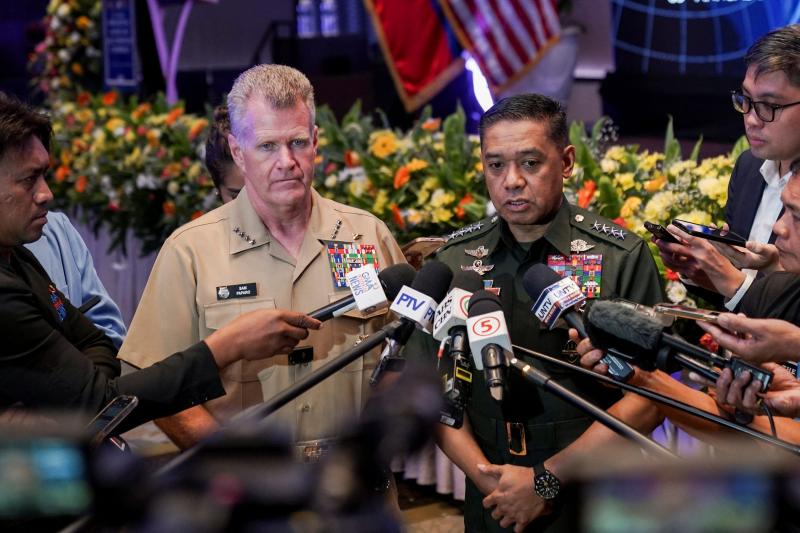The US military is open to consultations about escorting Philippine ships in the South China Sea, the head of US Indo-Pacific Command said yesterday amid a spike in hostilities between Beijing and Manila in the disputed waters.
Admiral Samuel Paparo’s remarks, which he made in response to a question during a news conference in Manila with Philippine Armed Forces chief General Romeo Brawner Jr, provided a glimpse of the mindset of one of the highest US military commanders outside the US mainland on a prospective operation that would risk putting US Navy ships in direct collisions with those of China.

Photo: Reuters
Chinese coast guard, navy and suspected militia ships regularly clash with Philippine vessels during attempts to resupply Filipino sailors stationed in parts of the South China Sea claimed by both countries.
As these clashes grow increasingly hostile, resulting in injuries to Filipino sailors and damage to their ships, the Philippine government has faced questions about invoking a treaty alliance with Washington.
Paparo and Brawner spoke to reporters after an international military conference in Manila organized by the US Indo-Pacific Command, at which China’s increasingly assertive actions in the South China Sea were spotlighted.
Military and defense officials and diplomats from the US and allied countries attended, but there were no Chinese representatives.
Asked if the US military would consider escorting Philippine ships delivering food and other supplies to Filipino forces in the South China Sea, Paparo replied: “Certainly, within the context of consultations."
"Every option between the two sovereign nations in terms of our mutual defense, escort of one vessel to the other, is an entirely reasonable option within our Mutual Defense Treaty, among this close alliance between the two of us,” Paparo said without elaborating.
Brawner responded cautiously to the suggestion, which could run afoul of Philippine laws including a constitutional ban on foreign forces directly joining local combat operations.
“The attitude of the Armed Forces of the Philippines, as dictated by the Philippine laws, is for us to first rely on ourselves,” Brawner said. “We are going to try all options, all avenues that are available to us in order for us to achieve the mission ... in this case, the resupply and rotation of our troops.”
"We will then seek for other options when we are already constrained from doing it ourselves,” Brawner said.
Philippine President Ferdinand Marcos Jr has said there has been no situation so far that would warrant activating the treaty, which requires the allies to come to each other's aid if they come under external attack.
US President Joe Biden and his administration have repeatedly renewed their “ironclad” commitment to help defend the Philippines under the 1951 treaty if Filipino forces, ships and aircraft come under an armed attack, including in the South China Sea.

Australia has announced an agreement with the tiny Pacific nation Nauru enabling it to send hundreds of immigrants to the barren island. The deal affects more than 220 immigrants in Australia, including some convicted of serious crimes. Australian Minister of Home Affairs Tony Burke signed the memorandum of understanding on a visit to Nauru, the government said in a statement on Friday. “It contains undertakings for the proper treatment and long-term residence of people who have no legal right to stay in Australia, to be received in Nauru,” it said. “Australia will provide funding to underpin this arrangement and support Nauru’s long-term economic

‘NEO-NAZIS’: A minister described the rally as ‘spreading hate’ and ‘dividing our communities,’ adding that it had been organized and promoted by far-right groups Thousands of Australians joined anti-immigration rallies across the country yesterday that the center-left government condemned, saying they sought to spread hate and were linked to neo-Nazis. “March for Australia” rallies against immigration were held in Sydney, and other state capitals and regional centers, according to the group’s Web site. “Mass migration has torn at the bonds that held our communities together,” the Web site said. The group posted on X on Saturday that the rallies aimed to do “what the mainstream politicians never have the courage to do: demand an end to mass immigration.” The group also said it was concerned about culture,

ANGER: Unrest worsened after a taxi driver was killed by a police vehicle on Thursday, as protesters set alight government buildings across the nation Protests worsened overnight across major cities of Indonesia, far beyond the capital, Jakarta, as demonstrators defied Indonesian President Prabowo Subianto’s call for calm. The most serious unrest was seen in the eastern city of Makassar, while protests also unfolded in Bandung, Surabaya, Solo and Yogyakarta. By yesterday morning, crowds had dispersed in Jakarta. Troops patrolled the streets with tactical vehicles and helped civilians clear trash, although smoke was still rising in various protest sites. Three people died and five were injured in Makassar when protesters set fire to the regional parliament building during a plenary session on Friday evening, according to

CRACKDOWN: The Indonesian president vowed to clamp down on ‘treason and terrorism,’ while acceding to some protest demands to revoke lawmaker benefits Protests in Indonesia over rising living costs and inequality intensified overnight, prompting Indonesian President Prabowo Subianto to cancel a planned trip to China, while demonstrators reportedly targeted the homes of the finance minister and several lawmakers. Rioters entered Indonesian Minister of Finance Sri Mulyani Indrawati’s residence near Jakarta early yesterday, but were repelled by armed forces personnel, Kompas reported. Items were taken from the homes of lawmaker Ahmad Sahroni and two others, according to Detik.com. The reports of looting could not be independently verified, and the finance ministry has not responded to requests for comment. The protests were sparked by outrage over